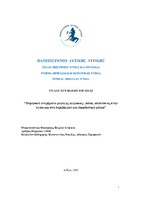| dc.contributor.advisor | DELEZOS, KONSTANTINOS | |
| dc.contributor.author | Βαζαίου, Ανδριάνα | |
| dc.date.accessioned | 2022-11-01T13:33:11Z | |
| dc.date.available | 2022-11-01T13:33:11Z | |
| dc.date.issued | 2022-10-15 | |
| dc.identifier.uri | https://polynoe.lib.uniwa.gr/xmlui/handle/11400/3273 | |
| dc.identifier.uri | http://dx.doi.org/10.26265/polynoe-3113 | |
| dc.description.abstract | Στη δεκαετία του 1950 και του 1960, πολλές χώρες πίστευαν ότι θα μπορούσαν να γίνουν ενεργειακά αυτόνομες με τη βοήθεια πυρηνικών σταθμών. Για το λόγο αυτό, η πυρηνική ενέργεια παρουσίασε διεθνώς μια τεράστια άνθηση κατά τη διάρκεια αυτών των ετών. Τις επόμενες δεκαετίες σχεδιάστηκαν και κατασκευάστηκαν πολλοί πυρηνικοί σταθμοί ηλεκτροπαραγωγής. Παρά τους μερικούς επικριτές , τόνισαν τους κινδύνους της χρήσης της πυρηνικής ενέργειας, και η αναχαίτηση της άνθισης της τερματισμός της δεν ήταν προβλέψιμη . Οι ευρωπαίοι γνώρισαν για πρώτη φορά τον κίνδυνο από τους πυρηνικούς σταθμούς ηλεκτροπαραγωγής το 1986 , όταν σημειώθηκε η πυρηνική καταστροφή στον πυρηνικό σταθμό της Ουκρανίας στο Τσερνόμπιλ. Οι επιπτώσεις αυτής της πυρηνικής καταστροφής έγιναν επίσης αισθητές στην Κεντρική Ευρώπη. Πρόσφατα, η πυρηνική καταστροφή στο πυρηνικό εργοστάσιο της Φουκουσίμα προκάλεσε μια έντονη αναστάτωση σχετικά με την πυρηνική ενέργεια και τις συνέπειες της τόσο σε ευρωπαϊκό όσο και σε διεθνές επίπεδο. Η παρούσα εργασία επικεντρώνεται στις επιπτώσεις των πυρηνικών ατυχημάτων στα ανθρώπινα όντα, τα ζώα και το περιβάλλον και στον τρόπο διαχείρισης τέτοιων ατυχημάτων . Ακόμη , γίνεται εκτενής αναφορά στην έννοια και την σημασία της πυρηνικής ενέργειας ενώ αναλύονται διεξοδικά τα περιστατικά στο Τσερνόμπιλ και τη Φουκουσίμα, καθώς και τα αποτελέσματά τους. | el |
| dc.format.extent | 88 | el |
| dc.language.iso | el | el |
| dc.publisher | Πανεπιστήμιο Δυτικής Αττικής | el |
| dc.rights | Αναφορά Δημιουργού - Μη Εμπορική Χρήση - Παρόμοια Διανομή 4.0 Διεθνές | * |
| dc.rights.uri | https://creativecommons.org/licenses/by-nc-sa/4.0/deed.el | * |
| dc.subject | Πυρηνικά ατυχήματα | el |
| dc.subject | Πυρηνική ενέργεια | el |
| dc.subject | Επιπτώσεις στην ανθρώπινη υγεία | el |
| dc.subject | Επιπτώσεις | el |
| dc.subject | Chernobyl | el |
| dc.subject | Fukushima | el |
| dc.subject | Nuclear accidents | el |
| dc.title | Πυρηνικά ατυχήματα μεγάλης κλίμακας: Αίτια, επιπτώσεις στην υγεία και στο περιβάλλον και διορθωτικά μέτρα | el |
| dc.title.alternative | Large scale nuclear accidents: causes, impacts on health and environmental, mitigation measures | el |
| dc.type | Πτυχιακή εργασία | el |
| dc.contributor.committee | Papadas, Ioannis | |
| dc.contributor.committee | Μπουλανίκη, Παρασκευή | |
| dc.contributor.faculty | Σχολή Δημόσιας Υγείας | el |
| dc.contributor.department | Τμήμα Δημόσιας και Κοινοτικής Υγείας | el |
| dc.description.abstracttranslated | In the decade 1950 and 1960, many countries believed they could become energy self- sufficient with the help of nuclear power plants. For this reason, nuclear energy has experienced a huge boom internationally during these years. Over the next few decades, many nuclear power plants were designed and built. Despite some critics, they emphasized the dangers of using nuclear energy, and the arrest of the boom and its termination was not foreseeable. Europeans first became aware of the danger of nuclear power plants in 1986, when the nuclear disaster occurred at the Chernobyl nuclear power plant in Ukraine. The effects of this nuclear disaster were felt in Central Europe as well. Recently, the nuclear disaster at the Fukushima nuclear power plant has caused a strong uproar about nuclear energy and its consequences both at European and international level.
This project focuses on the effects of nuclear accidents on human beings, animals and the environment and how such accidents can be managed. Also, extensive reference is made to the concept and importance of nuclear energy, while the incidents in Chernobyl and Fukushima, as well as their results, are thoroughly analyzed. | el |


